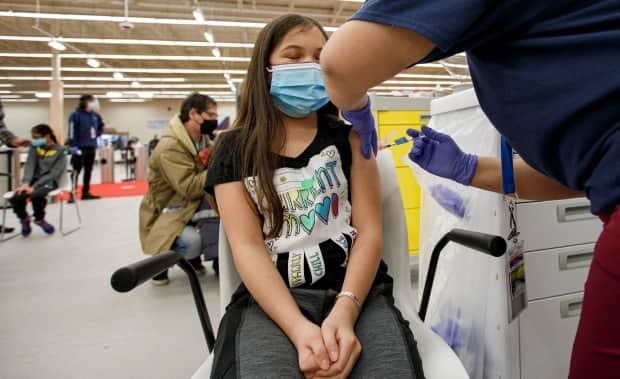Laval public health to launch vaccination blitz for 5-11-year-olds

Elementary students in Laval will have another opportunity to get their first COVID-19 vaccine dose in school as of next month, as public health officials attempt to boost lagging vaccination rates for five- to 11-year-olds.
Laval Public Health is launching a phone campaign and even knocking on doors to try to reach reticent parents ahead of the next round of in-school COVID vaccinations rolling out as of Jan 31.
The hope is that some parents will be persuaded to send their children for a first dose, as many of their classmates are already lining up for their second dose.
"We went to every school in Laval before the Christmas break," said Jean-Pierre Trépanier, regional public health director for Laval.

"A little more than half of people that age got their first shot. It's not [what] we expected, but … we have to start it over to make sure that every person who wants a shot will get it," he said.
The latest figures from Quebec's public health research institute, INSPQ, show Laval has the lowest vaccination rate for children of any region in Quebec at 51 per cent, just behind Nunavik (51.7 percent), Mauricie-Centre-du-Québec (52.2 per cent), Montreal (52.6 per cent) and Chaudière-Appalaches (53.7 per cent).
In contrast, more than 70 per cent of children in Saguenay, Gaspésie-les-îles and James Bay Cree territory have received at least one dose.
Even within regions, vaccination rates can vary greatly. On the island of Montreal, the vaccination rate for children ranges from about 76 per cent in Beaconsfield to less than 27 per cent in Saint-Léonard.
While most areas of Laval have hit child vaccination rates of at least 50 per cent, Chomedey lags behind at just 39.4 per cent.
Chomedey is the sector of Laval with the largest population of recent immigrants and the highest proportion of immigrants whose mother tongue is neither French nor English, which could mean public health messaging is not getting through, Trépanier said.
For that reason, public health "brigades" will go door-to-door to inform people about the vaccines in several languages including Arabic, Turkish, Armenian and Spanish.
"We have to give the right answers, the right way they can hear it and understand it," he said. "Sometimes it has to be from person-to-person in their own language."

Hesitancy still high among parents
But research suggests even these efforts may not be enough to boost vaccination rates dramatically.
"It's unlikely that we will reach an uptake as high as we did for adults," said Ève Dubé, medical anthropologist at the INSPQ.
Dubé said surveys of parents of children ages five to 11 conducted since September show that the percentage of parents willing to vaccinate their children has remained stable at 55 per cent.
WATCH | 'False impression' that kids aren't getting sick driving hesitancy, experts say:
"I think there's a group of parents that were vaccinated themselves but still are hesitant to have their children vaccinated," she said.
Dubé said some parents surveyed still felt the vaccine was too "new" while others did not believe the vaccine was necessary to protect children from serious illness. She said others may be holding off on vaccinating their children because they recently caught COVID-19.
But Dr. Fatima Kakkar, pediatric infectious diseases specialist at Sainte-Justine Hospital, says it's important to vaccinate children, even if they've already been infected with COVID-19.
"We're getting a few admissions per week and really, they're very severe," she said. "I would say that 30-40 per cent of those kids go to the ICU and really have a very complicated illness."
While Kakkar said that only a small percentage of children will develop severe COVID-19 symptoms, she and her colleagues are seeing some young patients who develop post-COVID inflammatory syndrome.

"[It] is bringing children to the intensive care unit on ventilators, on life saving support," she said, "and this is preventable with vaccination."
Schools welcome renewed vaccination campaign
Dubé said focusing on access to vaccination is the right strategy to combat hesitancy. She said providing vaccinations in schools may reduce the barriers that parents might face in getting an appointment and having to travel to a vaccination centre.
Paolo Galati, chair of the Sir Wilfrid Laurier School Board, said he visited several of board's schools during vaccinations in the fall and was impressed with the setup.
"They come in, they prepare and it's very organized," said Galati.
While the low vaccination rates in some neighbourhoods is a concern, it's difficult for school boards to know how those rates compare to the reality in individual classrooms, said Joe Ortona, chair of the English Montreal School Board.
"But obviously in some neighbourhoods on the island, there's some work to be done there and we need to take a look at why, are they vaccine hesitant for any reason?" he said.

